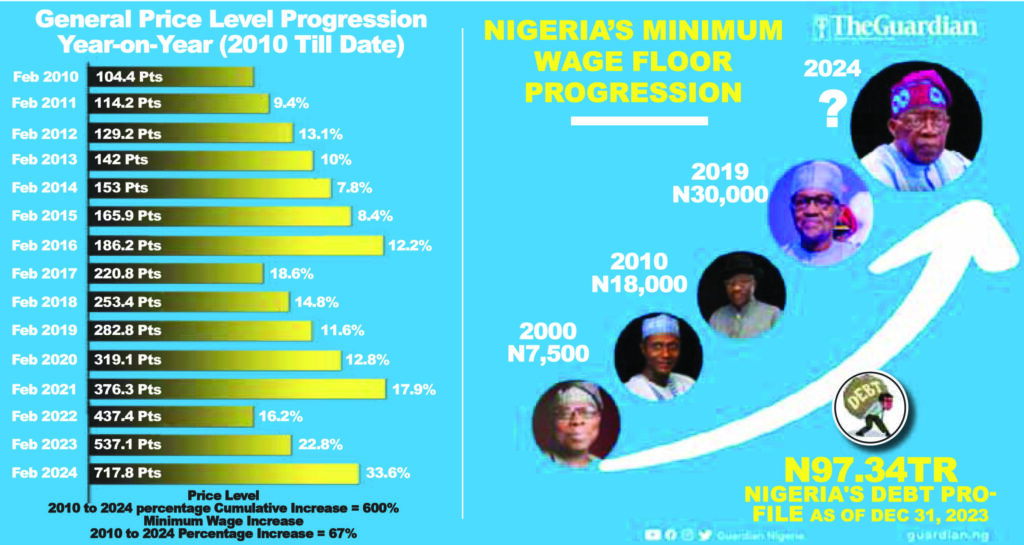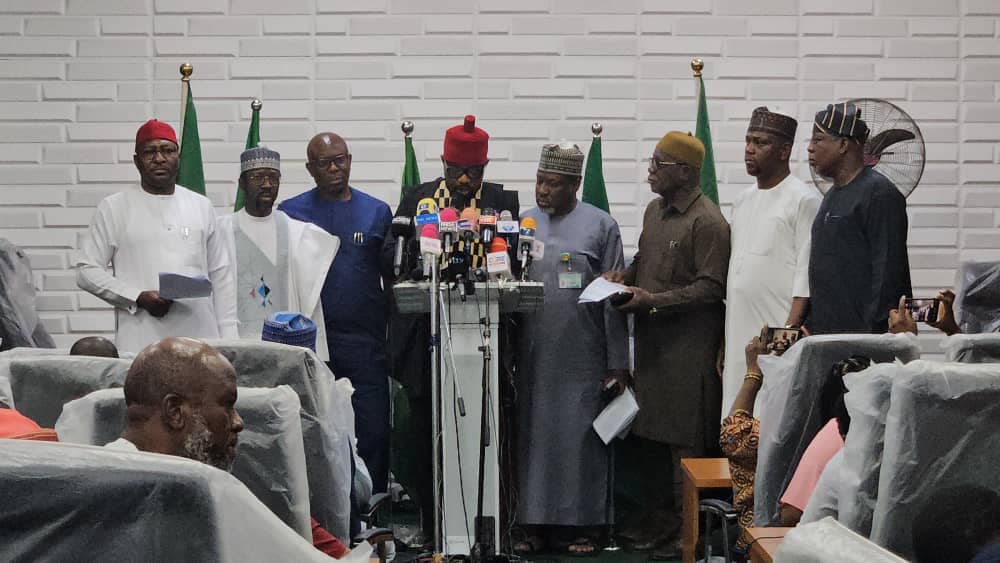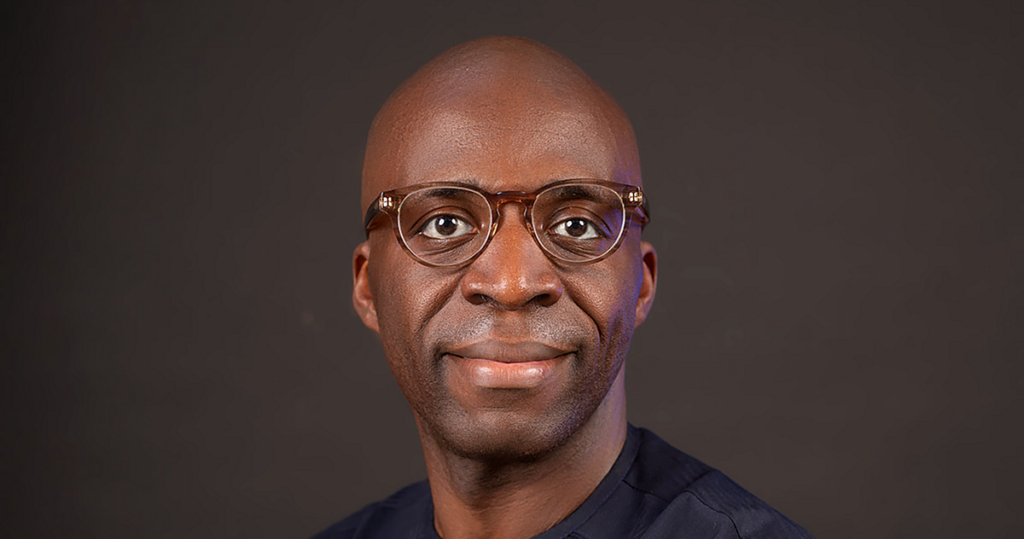
• Rising debts may encumber effective minimum wage
• 5 states yet to implement current wage floor act, says BudgIT analysis
• State govts yet to clear 2015 CBN’s wage support loans
As the race to set a new national minimum wage floor gathers momentum, the absence of a documented wage law may have thrown a spanner into the negotiation process.
Wage law prescribes the general rules guiding the determination of wages and how national minimum wages are set. It sets the parameters for negotiation, wage setting, implementation and sanctions.
Nigeria has had a history of weakly enforced minimum wage, a challenge many attributed to the absence of wage law.
The first attempt at implementing a national minimum wage came in 1945 when the late Michael Imoudu demanded the Cost of Living Allowance (COLA) as a railway worker. This was followed in 1981 when former President Shehu Shagari introduced the first structured national minimum wage.
In 1981, Nigeria implemented its first national minimum wage policy, setting a minimum wage rate to establish a floor for wages across different sectors of the economy.
In 2000, the federal government of Nigeria enacted the National Minimum Wage Act, which provided a legal framework for setting and adjusting the minimum wage rate in the country. The act established mechanisms for periodic reviews and adjustments of the minimum wage to align with economic realities. Then, the minimum wage was pegged at N7,500.
In 2010, there was a significant increase in the minimum wage in Nigeria following negotiations between labour unions and the government. The minimum wage was raised to N18,000, which was then considered substantial from the previous floor.
Then in 2019, the government signed into law a new minimum wage bill, setting the new wage floor at N30,000 per month. But all along, there was nothing in the books that made payment mandatory across all sectors.
Efforts to strengthen minimum wage enforcement in the past ended at the mere consultation or conceptualisation stages.
Hence, minimum wages are as effective as employees allow them, with authorities lacking the legal teeth to bring non-complying entities to book.
Ahead of the new minimum wage negotiation, BudgIt analysis said 15 states are yet to implement the 2019 30,000 minimum wages, raising doubt if the negotiated wage review would not end at official documents.
Already, the state governments are burdened by debts, poor internally-generated revenue and heavy costs of governance.
As at December 31, 2023 the states were carrying a debt burden of N10 trillion, which is 10.3 per cent of the total N97.34 trillion sovereign debt. The real debt load is much heavier as some of the state debts are not documented.
However, the fiscal constraints are not new to many states. Under the Salary Bailout Facility (SBF) established at the onset of President Muhammadu Buhari’s administration and administered by the former governor of the Central Bank of Nigeria (CBN), Godwin Emefiele, 31 states drew N457.17 billion in overdrafts to pay salaries with 74 per cent of the facility yet to be repaid by the broke states.
The states may even be worse off than they were about 10 years ago when they needed assistance to fulfill their wage obligations. For instance, The Guardian learnt that most states are refinancing matured debt instruments as opposed to liquidating them while salary payment now takes the back seat in the arrays of a potpourri of financial responsibilities the sub-national governments are grappling with.
For the private sector, paying high wages would not also be a walk in the park. First, cost minimisation has become a necessary survival strategy for many businesses, leading to upwardly sticky wages in most sectors – manufacturing and services included – notwithstanding the rising cost of living and the growing demand for living wages.
Last year, six multinational companies, including MTN Nigeria, Nigerian Breweries, Cadbury and Guinness Nigeria, known to be leaders in wage setting, lost N540 billion to foreign exchange depreciation and legacy challenges affecting the economy. The companies, whose decisions often trigger bandwagon effects, are said to have put ranges of cost-cutting options on the table.
Whereas wage cuts may not be one of the measures they could pursue to remain in business, some of them have long set in motion plans to reduce operating capacity, which would ultimately lead to a reduction in their payroll and add to the downside factor of higher salaries.
Amid the obvious setbacks, there is a current move in the labour circle to smuggle wage law into the minimum age negotiation to firmly anchor the implementation of the envisaged new minimum wage.
A major clause in the envisaged law would seek to criminalise non-payment of salaries, a demand that is generating controversy among the tripartite bodies – employers, government and labour unions.

Labour is proposing a living wage of about $300, anchoring its justification on the fall in the value of the naira. It said the current minimum wage has progressively lost its dollar value in the last five years when N30,000 became the national wage floor.
While the NLC was yet to quote any wage figure, as it retracted the N1 million it earlier mentioned, figures emerging from submissions made across the states and geopolitical zones during the zonal meetings with the Tripartite Committee on the Minimum Wage ranged between N447,000 and N850,000, which show how far off the organised labour is from the current reality.
For instance, in the South West, the NLC demanded N794,000, the North East where the NLC president, Joe Ajaero, chaired the hearing, proposed a monthly national minimum wage of N560,000. Both the NLC and Trade Union Congress (TUC) branches across the six states in the region jointly recommended the amount.
The North West leadership of the congress had proposed a minimum wage of N485,000.
In the North Central, the NLC chapter in the Federal Capital Territory suggested a revised minimum wage of N709,000. The TUC, FCT chapter, proposed a monthly minimum wage of N447,000, while South-South NLC recommended a minimum wage of N850,000. The NLC and the TUC in the Southeast region jointly recommended N540,000 and N447,000, respectively.
Seeking to bring coordination into the wage conversation, NLC President, Joe Ajaero, said all the figures flying around should be disregarded as the NLC was yet to adopt a common presentation on the new minimum wage.
He said the NLC secretariat has not made any presentation, stressing that when the union collates the minimum wages from states, “then we will do a central presentation based on these raw materials we are getting from states.”
He explained that labour will be guided in adopting a new minimum wage based on economic parameters which consider the current cost of living in the states as well as the exchange rate of the naira to the dollar.
“It (minimum wage) has to be relative to the cost of living in those states. You will agree with me that rent here is not as that in Abuja, and not the same thing as in Lagos. So relatively speaking you won’t have a straight-jacket like presentations by Labour in all the states,” Ajaero added.
Asked about the ideal wage for workers, he said: “We won’t be in their mind. They will come with theirs while we come with ours. There ought to be a market hearing because we are pegging our figure based on what the market says, so the government will not just come and offer us anything arbitrarily.
“They are the ones that have created the dynamics in the marketplace, so whatever they will pay us ought to be driven by the market. We expect them to pay us something that will take us to the market and bring food, accommodation, clothing, school fees and all of those back home. What we are asking for is whatever we would be paid should be something that will reflect the objective realities of the marketplace.”
He faulted economists who believed that what the government needed to do was to tackle inflation to cushion the rising cost of living rather than increase salaries.
He explained: “Anybody saying that is naive. Even if inflation is low, it does not obviate the need to increase the salaries of workers. But in this case, we have an inflationary rate of 31.7 per cent for February by the NBS, which is understated. What we have is about a 39 per cent inflation rate and when you factor that in, the value of the salary they are paying us is eroded by 39 per cent monthly. The continuous erosion of our salaries by 31 per cent means if paid N10,000 monthly, you have lost about N4,000, leaving you with N6,000.”

On his part, TUC President, Festus Osifo, said the two labour centres would harmonise to have a clear voice and position.
For TUC, he said the minimum wage must reflect reality and must be a living wage that must be able to take workers home. According to him, nobody must earn a wage that will just end in transportation.
“As of today, workers who live far away end up sleeping in their offices until Friday due to the high cost of transportation. This is because all the economic parameters have gone out of control, and the fiscal and monetary policies are not adding up. Nigerian workers are suffering and this must stop,” he said.
Director-General of the Nigeria Employers’ Consultative Association (NECA), Adewale-Smatt Oyerinde, said labour not harmonising before the public hearing showed their level of independence structure, which he claimed was normal.

“The minimum amount that the most vulnerable worker should not earn is the base amount. Some call it the entry amount and that figure also is subject to certain realities and conditions as contained in the high low convention 131 which is the basis of all this conversation. A key component of that condition is the economic situation and also the need for enterprise sustainability, So while we also bring in the issue of productivity. So we can’t rule out all those issues when we are talking about minimum wage, we can’t talk about it in isolation of a very important condition,” he said.
Also, the State Council, Aladetan Abiodun, urged that this was not the time for labour to engage in blame games but to unite and speak with one voice.
“At a time when food inflation is at 37.92 per cent which is 13.57 per cent points higher than the rate recorded in February 2023, we need labour’s unity to stem the tide. At a time when the cost of transportation is over the rooftop, we need labour solidarity to reverse the trend.
“At a time when the naira is exchanged for N1600 to a dollar and the purchasing power of the working people is weakening daily, we need to close ranks as working people to help get our country on track. We must focus on the goal at hand which is getting a reasonable living wage for those we represent as leaders.
“Labour must come together to present a common front. Unity is strength. We must all note that the union is the only voice of the working people.”
A lawyer and expert on labour matters, Paul Omoijiade, said that under the Trade Union Amendment Act 2005, both the NLC and TUC are supposed to come together for negotiation with a common figure, especially, as it called for a national negotiation.
“The issue is that in negotiation, the parties are supposed to frame their demands and also harmonise positions.
They should harmonise their position before coming up with their demands. They are not supposed to be talking in a discordant tone. TUC cannot call a figure while NLC is coming up with a different figure entirely, where the opposing party is aware, they would take advantage of it and it is not in the interest of labour at all.”












